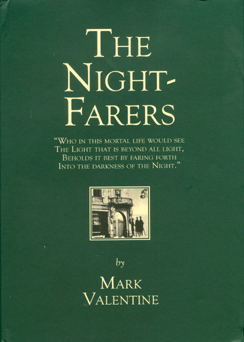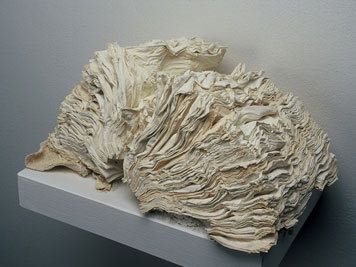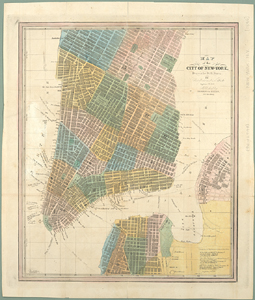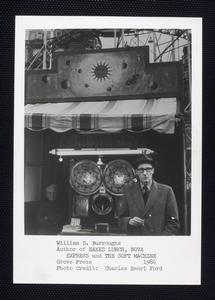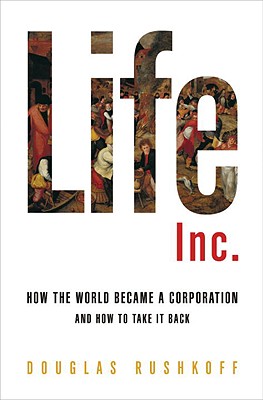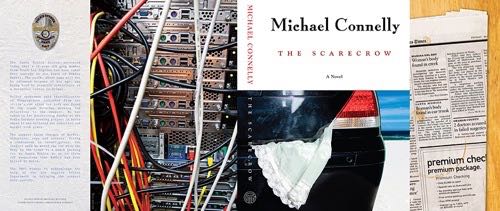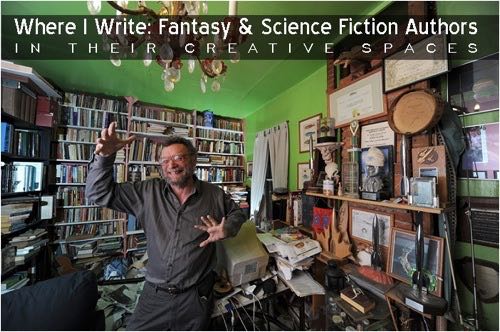
July & August 2009

24 August 09
Geography, Paradox, and a Few Friends

— Road Atlas of Great
Britain. 3 Miles to 1 Inch (W. & A.
K. Johnston, ca. 1955). I turned to this to get a sense of the geography
of the Isle of Axholme (175Bc), in Mark Valentine’s “ The
Axholme Toll ”. Do not, however, mistake the geography for
the story ; nor
the map for the territory. “ But I think I would believe more
in the truth of a place that does not claim them. ” A layered, complex tale, another gem in a fine book (see The
Nightfarers , below).
— Ernestine Schlant. Hermann Broch . (Twayne Publishers,
[1978]). Twayne’s World Authors Series 485. “ Strictly speaking,
the very existence of the novel [ Der Tod des Vergil ] is
a paradox. It is written by an author who had abjured literature and chosen the
vita activa even while he created one of the most inaccessible novels
our century
has to offer, second perhaps only to James Joyce’s Finnegans Wake .
The questions raised in the novel as to the ethically right way of life are
only
outside the novel . . . ”
I have added a short list of some favorite books to the FAQ page : books that are part of the “ permanent collection ” of the Endless Bookshelf and always close to hand. This is not an exclusive list ; some of these have already been noted, and essays about others (even closer to heart though sometimes unmentioned) will be posted in coming weeks. Three such books are :
— Traditional Japanese Poetry. An Anthology . Translated, with an introduction by Steven D. Carter (Stanford University Press, 1991). I received an advance copy of this and have been reading in it at intervals ever since. Some poems are rediscovered by chance, others are marked, such as these :
Dogen Kigen (1200-1253)
577. “ Worship Service ”
In a snowfall
that obscures the winter grasses,
a white heron —
using his own form
to hide himself away.
Also :
Matsuo
Basho (1644-1694)
838. WINTER On a cold night [Between 1680 and 1688]
My water jar cracks —
broken by ice in the night
as I lie awake.
And one of the reasons this book remains within close
reach :
Minamoto no Sanetomo (1192-1219)
521. BUDDHISM. A poem on “ On the Middle Way of the greater Vehicle ”
Our life in this world
is like the image one sees
inside a mirror —
something that’s not really there,
but then not really not there.
— Eric Sackheim. . . . the silent Zero, in search of Sound . . . . An anthology of Chinese poems from the beginning through the sixth century . Translated by Eric Sackheim, with calligraphy by Ch’en Yung-sen. (Mushinsha Limited / Grossman Publishers, [1968]). A beautiful and wild book, theory of translation in action, with all sorts of interesting allusions and citations in western literature as well as Chinese and Japanese. Images and juxtapositions of words. A signed copy, gift of the author’s widow, whom I met some years ago.
— Das Oxforder Buch Deutscher Dichtung vom 12 ten bis zum 20 sten Jahrhundert herausgegeben von H. G. Fiedler . . . Mit einem Geleitworte von Gerhart Hauptmann (Oxford, 1911). A comparatively recent arrival : my grandmother’s copy, with her note, Christmas 1913. I read Goethe’s “ Wandrers Nachtlied ” (Über allen Gipfeln . . . ) at my father’s memorial last year, as a gesture to the German-speaking origins of the family (I am the only one of my generation to speak German), and then three weeks later found it among the poems transcribed by my grandmother in her commonplace book. Other pleasures to be found include Goethe’s “ Erlkönig ” (Wer reitet so spät durch Nacht und Wind . . . ) and “ Der Zauberlehrling ” (The Sorcerer’s Apprentice), Schiller, Heine, and many poems now mostly forgotten in these parts.
La république des livres
Pascal Assouline’s column on books & literature from Le Monde << http://passouline.blog.lemonde.fr/ >>
is always worth a look :
And in a discussion of how words such as “ journalism ”, “ news ”, and “ media ” are behind the times, no longer employed in the twenty-first century, after noting how curious that a German-language news magazine, Der Spiegel , should publish an interview in English, and only online, he continues :la Bibliothèque Nationale de France va confier la numérisation de son fonds à Google. “ Une partie seulement de son fonds ” dit-on encore ce qui est, là encore, un euphémisme. Il aura donc fallu quatre ans pour que la Bnf passe de la résistance à la collaboration.
Détail croustillant : sur le site, l’article est classé à la rubrique “ Zeitgeist ”. Un mot qui n’est pas près de se démoder.
There is an excellent reflection upon Louis Sébastian Mercier, proto-science-fiction writer and chief neologist, in the entry of 28 July 09. (I generally skip the comments, which seem to degenerate rapidly.) Assouline is wide-ranging and witty and interesting as critic, resembling in this Michael Dirda, sometime book columnist of the Washington Post Book World and author of Readings. Essays and Literary Entertainments (Indiana University Press, 2000) and Classics for Pleasure (Harcourt, 2007).
20 August 09
Thinking about AB Bookman’s Weekly

Last week I sorted, packed, lifted, and shipped the editor’s bound file
copies of AB
Bookman’s
Weekly to a distinguished American library, where someone else will
someday, I hope, write the comprehensive study of the rich cultural, social,
and economic history of the book that this periodical contains. Founded by Sol
Malkin
[SMM]
in 1948, the Antiquarian Bookman had its origins in the section
of Publishers Weekly devoted to the out of print book trade. For the
next half-century, the AB was a weekly part of the book world. Malkin
turned it over to Jacob L. Chernofsky [JLC] in the early 1970s. Your correspondent
[HWW] worked there as staff writer and later managing editor from 1996 until
late in 1999, just before the magazine ceased publishing.
Looking into the huge, thick 1972 volume, the final issue for 25 December included
memoirs
of
I.R. “ Ike ” Brussel, L.O.T.G.S. (Last of the Great Scouts),
book scout and bibliographer,
by his friend William White, Malkin, and John Carter. The Americana specialists
Edw. Eberstadt announced the firm’s departure from New York City for a
suburban New Jersey office (Johnny Jenkins bought their stock in 1975); hard
to
tell
whether
the
trend
for
booksellers
to
leave city
centers
was
well
established or only just starting then (it is now almost complete). Scanning
the
major advertisers, I noted only two familiar names among the specialist dealers
(Patterson
Smith
and Charles B. Wood III), and began thinking about how the book world has changed
over the decades since then.
Just as now, it was a time when booksellers with customers sought books, and
booksellers with books sought customers.
Information
was
a
scarce
and imperfectly distributed commodity — but the nature of the scarcity
and
how the information was conveyed differs quantitatively and qualitatively from
the
way it occurs now, in the twenty-first century :
those
who
had
customers
and
needed books published long and very specific lists of wants or issued broad
guidelines for subjects of interest, and those who had books quoted single books
or long lists.
Each
week
saw
a
successive
wave
of new information, with a few short articles and capsule reviews (a sentence
or
two)
and columns
about the book trade. A common language existed for description of condition.
Centralization is a key concept to understanding this time : centralized
sources
of
information dispersed through the medium of print, a flow of books to institutions
building
collections
of
original
editions and the endless series of reprints, cities as points of concentration.
Books
seemed
to
be
locally
scarce,
fuelling a steady demand.
All this changed in the late 1990s — when the twenty-first
century began for the antiquarian book world : various kinds of information
began
to
migrate
to
the
internet,
and
an
entirely
different
picture of scarcity and demand evolved. Certain books for which there had been
a steady demand now proved to be available in vast quantities, while other books
thought to be scarce turned invisible (and in fact supremely rare).
The
weekly
forum once read by everyone — whether they hated it or loved it or were
simply
indifferent —
became
irrelevant in the space of a few years. Not without loss, for no single publication
(online or print) has ever really
filled the place of the AB .
“ Things
fall
apart ; the centre cannot hold ”. And
the
making
and
finding and selling of books continues.

Thing, Event, Word
In the mystery
form, as in poetry, the reader is alert to
the significance of thing, event, word :
that
by
reading,
a pattern may be discerned and meaning attained.1 Even while
being entertained one’s ear may be stimulated and the palate amused
by the writer’s careful
attention to language.2 I am willing to follow some writers
anywhere they go in prose, if I sense there is a precision of language
and an awareness
of how words play on the page. Then there are other writers to whom
the only response is the scalpel of critical thinking : to read
them with the ferocity of Joanna Russ3 and
to see that imprecision in the narrative voice defines a pathology.
For a writer of a detective story
to
have
a character
unable to choose between light and dark brown sugar in a supermarket
can only be interpreted as a portrait of consumption induced paralysis
— or else the writer is simply wasting the reader’s time.4
1. The Endless Bookshelf aspires to the state of collective
enterprise but until that happens it remains largely the work of your
correspondent [HWW] and the many authors whose books dance across its
screens ; the whims and interests of your correspondent
will dictate contents — this is why, from time to time, I attempt to
define said whim and fancies, and even to identify the assumptions
whence they derive.
2. “ The Peninsula ” is a exemplary story by Avram Davidson
— not
a major
work but made interesting by what George Scithers called “ his always
perceptive
ear for regional dialects ” (The
Other Nineteenth Century . Tor, [2001], pp. 231-242).
There are countless other examples : Cross by Ken Bruen, noted
below,
captures the play of English as spoken by the Irish and gives a spare picture
of Galway (and sparked these reflections).
3. An end to what Russ calls “ evasion of the hard questions ” (Joanna
Russ, To Write Like a Woman .
Indiana Univ. Pr., [1995], p. 159). And from “SF and Technology as Mystification”,
elsewhere
in
the
same
volume : “ Eat
a little economics. Eat
a little political analysis. You’ll think better” (p. 39).
4. “ And Angelica’s list said brown sugar, but even that came
in two
choices.
Should she buy the dark or the light ? ” (Lorna Barrett, Bookmarked
for Death , Berkley Prime Crime, [2009], p. 43). A memory from the
days of the hardball workshop round table at Columbia, what someone (Stephen
Dubner ?) called the “ Get Real ”
point, the sentence at which a critical reader pauses to query the writer’s
grasp of technique or effect or even the writer’s basic awareness
and
control of words.
Recent Reading & New Arrivals ; Also :
Just a Glance, or, Pulled out of a Box
—
[Timothy D’Arch Smith, with clerical assistance from Ed Maggs] Baron
Corvo from the Collection of Donald Weeks (Maggs Bros. Ltd, 2009). Edition
of 126 copies, in paper wrappers, in 7 point sans serif type. The introduction
is a fine piece of D’Arch Smithery, and there is much curious and
interesting here, including a photograph of Baron Corvo’s revolver *.
The collection is now at the Brotherton Library, Leeds University. Your
correspondent enjoyed The Quest for Corvo by A.J.A. Symons but is otherwise
immune to the Corvo bacillus.
— Kelly Link. Pretty Monsters . Stories (Random House, 2008).
— Peter Straub, editor. American Fantastic Tales. Terror and the Uncanny.
From Poe to the Pulps [and] From the 1940s to Now . (Library of America,
forthcoming October 2009). Proof copies, 1450 pages of stories, to be
read closely and reflected upon for a review.
—
Fairground Fiction. Detective Stories of the World’s Columbian
Exposition . Reprints of Against Odds. A Detective Story by
Lawrence L Lynch (E. Murdoch
van Deventer), 1894, and Chicago Charlie, the Columbian Detective by
Lieut A.K. Sims (J.H. Whitson), 1893. Edited by Donald K. Hartman. Foreword
by
Carl S. Smith.
— Ken Bruen. The Hackman Blues . (Do Not Press, 1997).
—
Ken Bruen. Cross . (2007; St. Martin’s Minotaur, 2008).
— Lorna Barrett. Bookmarked
for Death . (Berkley Prime Crime, [2009]).
— Robert Sattelmeyer. Thoreau’s Reading. A Study in Intellectual
History with Bibliographical Catalogue (Princeton Univ. Pr., [1988]).
What a fascinating
book, pulled out of a box of Books to Be Read : “ Decayed literature
makes the
richest of all soils ” (from Thoreau’s Journal ,
1852). Darwin, Whitman’s 1856 Leaves of Grass , De Quincey,
Bartram, the
sources
for Walden and
“ Resistance to Civil Government ”. More to come on this
book and what channels it opens.
* Literary artefacts ; or : Musty Old Wool & Cold Steel
A lock of Byron’s hair
D. G. Rossetti’s black Inverness cape1
Baron Corvo’s revolver
Hemingway’s suitcase
Will James’ riding coat (collection of Don Frazier)
les pantoufles de Somerset Maugham2
Raymond Chandler’s trenchcoat3
William Gibson’s typewriter4
Isaac Asimov’s computer5
1. Worn by the young Ford Madox Hueffer while skulking
about London : “ he later took to wearing D. G. Rossetti’s
black Inverness cape and Madox Brown’s fifteen-year-old blue linen shirt
and red satin tie ” (Alan Judd, Ford Madox Ford . Collins,
1990, p. 28)
2. Seen by a colleague appraising the collection of bibliographer and
poet J.D. McClatchy.
3. Frank MacShane related to me that his publisher Jamie Hamilton arrived
in Kathmandu and knocked at his door, wearing Raymond Chandler’s
trenchcoat, to persuade him to write the Chandler biography.
4. Hermes 2000 portable (on which Gibson wrote Neuromancer and
the early stories of cyberspace).
5. Seen in the window of the Science Fiction Bookshop in the west Village
in the early 1990s.
‘ to expand their
minds ’
London publisher John Calder reflecting on more than
50 years as a publisher (courtesy of Momus http://imomus.livejournal.com/481803.html ) :
“ Publishing is about more than getting a return on an investment or being fashionable," he told Textualities . “ Publishers have a chance to contribute to making a better world. I recently published Jeff Nuttall’s Art and the Degradation of Awareness , in which [Nuttall] says ‘ Art gives out of courage; fashion takes out of fear. ’ Most of the ‘ art ’ we hear about today is fashion driven by commerce. Money is just a means of exchange, a means of keeping a roof over your head and all that, but to pursue wealth for its own sake is decadent. I agree with Samuel Beckett that one has to teach oneself not to want things. One wants many things for no better reason than that advertisers train us to want them . . . The point of everything I do remains the same : to make ideas available to people, to expand their minds. ”
12-13 August 09
The Nightfarers
— Mark Valentine. The Nightfarers (Bucharest : Ex
Occidente Press, MMIX). Frontispiece
by John Coulthart. 191 pp. Green cloth, upper board titled in gilt,
dust jacket with vignette, “ The Dawning of the Rakes ” by
Mathieu Caragiale. Limited to 350 copies.
ISBN : 978-973-7764-22-5
http://exocccidente.com/nightfarers.html (Note
the URL with three “ c ”s.)
NOTE December 09 : URL is now with two “ c ”s : http://exoccidente.com/
A beautifully produced collection of short fantastic
fiction, with an antiquarian and bookish flavor, to be read very attentively.
Mark Valentine,
whose writings I have seen in the publications of the Arthur Machen Society,
proves to be a deft composer. Some of the tales are hommages to Shiel
and Hodgson ; the decadents and the late Victorian and Edwardian
ghost story writers. Valentine’s
concerns are books and postage stamps and old vellum charters —
and the people obsessed with such artefacts — and what befalls
the traveller after dark. The best stories,
such as “ White Pages ” and “ The Dawn
at Tzern ” and “ Undergrowth ” and “ The
White Sea Company ” create original magic on the page. Lots
happens in these pages, but rather than seeking outward dramatic effect,
the transformations are inward, in the
characters
and in the
reader. “ The Dawn at Tzern ” evokes the lost world
of the old Balkan principalities better than anything I have read since
The Adventures of Dr. Eszterhazy by Avram Davidson (and this story has
quite an eventful conclusion). “ Undergrowth ” is a superb,
carefully controlled tale, a genuine addition to the dangerous book canon. I
have
not
finished the collection and will likely
have more
to observe. [HWW]
The List as Critical Model
The list is a resilient critical structure that offers,
simply by association, interesting and demanding juxtapositions. Two
recent examples from E-Verse Radio show the possibilities. I had never considered
the last item on the second list in the context of Utopia or Dystopia :
its pre-eminence in the form admits no question. Thank you, Bethany.
Bethany Brings Us Top Five All-Female Utopias/Dystopias
5. The Female Man by Joanna Russ (1975).
4. Ammonite by Nicola Griffith (1992).
3. Y: The Last Man by Brian K. Vaughan; art by Pia Guerra and José Marzá,
Jr. (2003-2008).
2. The Book of the City of Ladies : written in 1405 by Christiane de Pisan.
1. “ Houston, Houston Do You Read ? ” (1977),
short story by James Tiptree, Jr. (i.e. Alice Sheldon).
Ernie (a male of the species) suggests two alternates :
Herland by Charlotte Perkins Gilman (1915).
The Wall by Marlen Haushofer (1962).
http://everseradio.com/bethany-brings-us-top-five-all-female-utopiasdystopias/
Top Five All-Male Utopias/Dystopias
5. World Without Women by Day Keene and Leonard Pruyn (1965).
4. The Gate to Women’s Country by Sheri S. Tepper (1988).
3. Mars Needs Women (1968), film.
2. Ethan of Athos by Lois McMaster Bujold (1986).
1. Seven Pillars of Wisdom. A Triumph by T.E. Lawrence (1926).
http://everseradio.com/top-five-all-male-utopiasdystopias/
9-10 August 09
A Future of the Book ; or, Several Futures of the Book
Eric Baker at Design Observer
http://observatory.designobserver.com/entry.html?entry=10247
“ Eventually I began looking closer, or should I say broader
at ‘ things ’.
Things lost on the fringes . . . ordinary, odd,
beautiful things. Esoteric images, old diagrams, typography, cartography — visions
of a once promising but now extinct future. ”
That is a pretty dire view, which is disputed root and branch, tree
and leaf, by your correspondent ;
the selection of pictures of book objects, including the
following, is wonderful :
Courtesy of Bruce Sterling, who remarked “ Books aren’t what they used to be. ”
Hiding in Plain Sight
While tending to communications today, your correspondent noted that due to emphasis on sampling current and recent books a number of permanent favorites of the Endless Bookshelf — core books that sit on real bookshelves in the yellow house — have not yet been mentioned. It would be impossible or even laughable to name a solitary favorite book, but some of these books do not even figure on the earliest list of favorites of the Endless Bookshelf. These omissions will be remedied in future posts.
Current reading
— Farah Mendlesohn, editor. On Joanna Russ (Wesleyan
University Press, 2009). I have read only Mendlesohn’s introduction
and Graham Sleight’s essay on the short fiction. I look forward to
reading Edward James’ look at Russ as reviewer of science fiction,
and to widening my knowledge
of Russ.
Last year I reviewed her collected critical writings for NYRSF, The Country
You’ve Never Seen (Liverpool University Press, 2007), curiously
omitted from the bibliography of the present volume).
Sleight’s essay has a compelling penultimate sentence,
comparing her work to Theodore Sturgeon, James Tiptree, Jr., and Gene
Wolfe :
“ But Russ exceeds those, even Tiptree, in the
fierceness with which she addresses her material, the
sense that she exhausts the material at the same time as the story. ”
And for contemporary readers (and writers and reviewers), Sleight’s
final sentence is, like the work of Joanna Russ, more demanding still :
“ The challenge for readers now — when some feminist
arguments have been, if not won, then at least normalised into Western
culture —
is to see that her fierceness is necessary : that these battles
have not been won and that, as always with letters, the onus is on the
reader : what do you do now ? ”
John Crowley’s Summer Reading
List
August 8th, 2009
06:28 pm
Books I have read, re-read, am reading, and will read in the course of a fiction-crammed
summer. It will be obvious that I am writing about Nicholson Baker, and about
ghosts in fiction.
A Box of Matches , Nicholson Baker
U and I , Nicholson Baker
The Everlasting Story of Nory , Nicholson Baker
The Anthologist , Nicholson Baker
(Also re-looked-at The Mezzanine , Vox , and Room Temperature .)
The Love We Share Without Knowing , Christopher Barzak
Beyond Black , Hilary Mantel
Alive in Necropolis , Doug Dorst
Asleep , Banana Yoshimoto
Stories by Haruki Murakami
Midnight Picnic , Nick Antosca
In Persuasion Nation , George Saunders, and other stories
Intro and selections from The Norton Book of Ghost Stories , ed. Brad Leithauser
Little Stranger , Sarah Waters
Magic for Beginners , Stranger Things Happen , Kelly Link
Waiting for the Straub-edited anthology [American Fantastic Tales] mentioned
[earlier].
This is more fiction than I have ingested in any summer since . . . I don't know
when, sometime in the late sixties or early seventies probably, consuming John
Barth and Thomas Pynchon and the Ballantine fantasy novels and Ada and and . . .
http://crowleycrow.livejournal.com/121259.html
Rudy Rucker’s Summer Reading
J.G Ballard, Miracles of Life
SF as a lens to understand the present, “ looking for the pathology
that underlay the consumer society, the TV landscape and the nuclear arms race. ”
Thomas Pynchon,
The Crying of Lot 49
“ As another way of reawakening myself as a writer, I’ve been reading
Pynchon’s
old novel, The Crying of Lot 49 , and Ñ as so often with Pynchon Ñ it
feels
as if
the Muse is talking to me through his work. ”
http://www.rudyrucker.com/blog/2009/08/08/seattle-and-canada-ballard-pynchon/
6-7 August 09
“ the last book I will ever publish ” :
Epitaph for a Small Press with Style
Dennis McMillan sent me a long letter, written in the first few pages
of a copy of The Scarecrow, that marks the end of an era. Beginning
with some of his Fredric Brown in the Pulps paperbacks, I bought the
books of Dennis Mcmillan, Publisher when I could find them or afford
them. In 1997, after I wrote an essay on R.
H. van Gulik, I came across
the
writings
of Janwillem
van de Wetering — Dennis published his biography of van Gulik,
now a scarce book, as well as Mangrove Mama , a collection
of Janwillem’s stories — and
met the flamboyantly dressed publisher at the 1998 Bouchercon in Philadelphia
where Janwillem was guest of honor. We would exchange the occasional
letters,
and I continued
buying his books, to read, and sometimes to give to friends. The list
of authors he published includes Michael Connelly, Jon A. Jackson, George Pelecanos,
Scott Phillips, Kent Harrington, Jim Nisbet, and others. The world of
micropublishing is diminished by the end
of DMP. But what a
stylish
run of books he produced !

For Henry —
friend & compadre of Janwillem & mah humble self ; a copy of
the last book I will ever publish, for many reasons [. . .] So
I will now face the Void
alone, not championing any others’ works or ideas, playing flamenco guitar
for my only defence against the coming night. But I’ll have more fun doing
it that way than I ever did trying (& failing) to promote
art that wasn’t
my own. So I depart book publishing feeling that I’ve probably left some of “ my ” writers in the lurch, but I’ll be facing, myself, what
they’ve always had to face, when they stared at that blank page that awaited
them every time they went to create.
To quote our late friend — “ It
should be ‘ interesting ’ — ”
from
Dennis McMillan
Publisher
(guitarrista flamenca)
With two footnotes in Dennis’ hand, the first on the dedication page beneath the printed dedication To James Crumley for The Last Good Kiss :
“ I came into this world kicking and screaming & I’m going to leave it the same way.”
James Crumley, “The Crum-devil” Sept 11, 2008.
Oct. 12, 1939 — Sept. 17, 2008
Three Rivers Texas — Missoula, Montana
R.I.P., Brother
-30-
And the second on the fly-title:
“ Life is a thin surface tension of civility floating on a bottomless sea of rage. ”
— Russell Michaelsen, Tucson, winter 2008-9
Thank you Dennis, and Success ! to you in your new activities.
New York Public Library Blog
Frequently updated with contributions from different
branches on a variety of subjects, ranging from feminism in America
to the William Burroughs archive
in the Berg Collection ; from capsule reviews of recent young adult novels
to reflections
on It Can’t Happen Here by Sinclair Lewis or the Cambridge
Edition of the Works of Jane Austen ; with many
images
and
maps from the collections :
http://www.nypl.org/blog
Ickenham, the trickster Earl
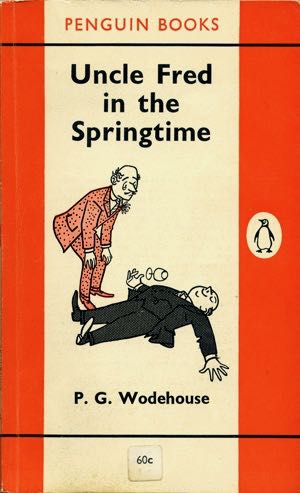
— P.G. Wodehouse. Uncle Fred in Springtime (1939 ; Penguin pbk, 1961). I am re-reading this for the first time in decades, in large part because I was startled and intrigued by an acute observation made by Tom La Farge in Administrative Assemblages (briefly noted upon its publication on 1 June) concerning a remark by “ P.G. Wodehouse’s great trickster earl ‘ Uncle Fred’ ” : “ I am not very well up in the Peerage. I seldom read it except to get a laugh out of the names. ”
Wodehouse employs the words “ confidence trickster ” two pages further into the same chapter, but La Farge’s comment suggests a broader significance to Lord Ickenham, for Uncle Fred in Springtime is Coyote the trickster meets The Importance of Being Earnest , a primordial energy of gleeful disorder striding into the drawing room/country house farce. There is a dizzying choreography at work here. In the same way that Raymond Chandler would have a man with a gun enter the room to stir the plot, again and again Wodehouse knows to send in the one person who will complicate matters still further and tangle the standard conventions of London society, loony aristocrats, and star-crossed lovers. The snappy dialogue is allusive and Wodehouse plays English literary snippets against clichés with skill and range. The merriment and chaos of Uncle Fred can only be tamed by a power equally elemental : the wife (the goddess revered and feared though never seen in person in this novel).
— Arthur Lyons. Castles Burning (Holt
Rinehart and Winston, 1979).
—— Hard Trade (Holt
Rinehart and Winston, 1981)
—— Other People’s
Money (Mysterious Press, 1989).
—— False Pretenses (Mysterious
Press, 1994).
I had read a few early novels by Lyons when they appeared in paperback,
including Castles Burning , which is a spare and well written
book. Hard
Trade is cynical in the extreme about city politics, real estate
development, and connections. False Pretenses has moments of
criminal police depravity but lacks the really black humor that sparkles
in the the Miami
novels
of Charles Willeford. Reading Other People’s Money ,
I recognized a plot device borrowed straight from August Derleth, “ The
Adventure of the Golden Bracelet ” (The Solar Pons Omnibus.
Volume Two , p. 1274)
: an exotic woman met on a train, a golden armlet, and a mysterious
Turkish treasure that ensnares an ambitious archaeologist (who is permitted
only
to sketch the artefacts). Lyons takes this idea much further than Derleth,
and the novel exposes the rapacity of collectors and the manipulative
politics of museum boards, and layers betrayal upon betrayal.
The Anonymous Other described the Lyons private detective novels as the guy equivalent of chick lit (certainly False Pretenses has an element of that, but my knowledge of the chick lit genre is limited — to be remedied).
A couple of sentences have been added to the review of The Manual of Detection , quoting passages from the poker game chapter. The marginal gloss about the tulip tree (from Walt Whitman) was first intended back when the tree “ near by ” was in bloom, only now cited. Several updates this day, now concluded to the sound of crickets in the dusk.
4 August 09
Only Connect
— Douglas Rushkoff. Life Inc. How the World Became a Corporation and How to Take It Back (Random House, 2009). Empowering historical, ethical, and social consideration of the fundamental nature of the global economy and the implications for human life of the ascendancy of the corporate model. Rushkoff describes how utterly the centralized monetary policies of governments and the extractive nature of corporate entities have combined depersonalize human interaction. The key is the disconnect :
“ The higher the capitalist was on the economic ladder, the broader and more varied were his investments and enterprises — and the more disconnected he was from his business’s skills and the people performing them. ”
And :
“ Only a world steeped in this false notion of a wholly sovereign individual could have could have generated the bourgeois merchant class of self-made men threatening the static power o the aristocracy. [. . .] The more disconnected people became from one another, the more easily they could be manipulated. ”
The distinction between creating value (i.e., real work
within a community) and extracting value (removed for shareholders at
a distance)
is useful
and demonstrates the tensions between the yin of Disperse and the yang
of Control*. What impressed me about Life Inc. was the
way Rushkoff kept probing at some pretty basic assumptions of modern
life and pointed to
inherent contradictions and impossibilities of the corporate mode.
His timeline of public relations and social manipulation makes concrete
and factual
what Wm.
Burroughs had
already codified : “ Trak Trak Trak. ”
Rushkoff’s analysis is compelling and his concluding chapter is
a succinct reminder to connect at the real, human level. The internet
— instead of fostering alienation and distance — can become
a tool for positive change :
“ Complementary currencies make it easier to record and administer
value exchange in an increasingly decentralized marketplace.” Rushkoff
acknowledges that corporations will not disappear : his call
for local
action from
the bottom up, including the use of alternative currencies, is a reasoned
challenge to reclaim arenas of life lost to definitions in monetary
and quantitative terms.
Read this book.
[Candid disclosure: once upon a time, your correspondent knew
Doug Rushkoff in the course of a successful experiment in reviving a failing
social enterprise.
Your correspondent was the leader of a peaceful “anarchist” kitchen
workers’ collective and learned about vegetarian food. For
another perspective on those foolish days, see the recent Lost
in the Meritocracy by
W. Kirn.]
* My terms, not Rushkoff’s
— Jedediah Berry. The Manual of Detection (Penguin, 2009). A splendid novel of an unwilling detective in an idealized, rainy City in an earlier time (typewriters and phonograph records and dumb waiters), where the struggle is between the Agency and the Carnival — what a dichotomy ! — and a voice singing cryptic, catchy lyrics loops through the consciousness of the reader. The naming of the Carnival’s owner is suggestive and deliberate ; the utterances credited to him are potent :
“ Everything I tell you is true, ” he said, “ and everything you see is as real as you are. ”
“ I tell you the unknown will always be boundless. ”
Words are used playfully but always to a point. “ I had developed memory exercises to retain all the information entrusted to me. Imaginary palaces, archives of the mind. They were structural ; I could feel their weight in my head. The supports had been bending and groaning for a long time. I had only to loosen a brick or two, and let the rest collapse. ” Or : “ Had his mind already turned to dust ?” There is a memorable poker game in chapter six : “ ‘ We play for questions. ’ [. . .] ‘ Ante is one interrogative. ’ ” The stakes are queries, inquiries, perscrutations, catechisms, and interrogations. “ He traded in all his chips, which was enough, Zlatari told him, for the most severe sort of question the game allowed. The inquisition would be answered by everyone at the table. [. . .] ‘ The price of some questions is the answer, Detective. ’ ” And the collision of the literal and the metaphorical in the person of the Overseer is both surprising and inevitable.
The
Manual of Detection displays its charms with a dreamy precision that
seems to merit
a
Latinate name as evocative as Crowley’s infundibular geography in the final
edition of Architecture
of Country Houses . The
Manual of Detection is
at once a perfect, complex piece of origami that folds upon itself to be
a completely different yet not unrelated form, or a painting of crows in
the noon sky that is white doves on a moonlit night : it is a fun, flexible
dance of a book.
And your correspondent signs off for now, late on a summer night.
29 July 09
Hope Mirrlees
on the Web. Her work, life, and historical context
Information central, a stylish new website with real content : http://www.hopemirrlees.com
(Note the fly on the apple in the still life by Clara Peeters.)
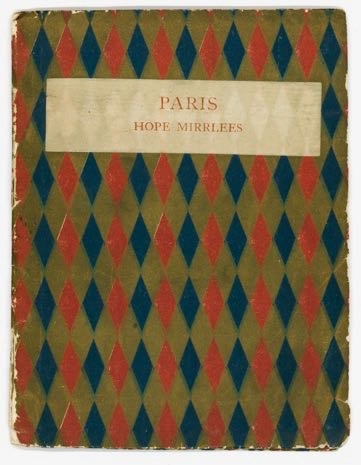
28 July 09
Grammar of Human Life
— John Clute and Jason Van Hollander. Fustian . Special Edition. Merion Station, Pennsylvania : Magic Pen Studio, [2006?]. Illustrated. 18, [2] pp. Pictorial self wrappers, front cover image a modified version of the portrait of Clute by JVH published at the entry for FUSTIAN in The Darkening Garden (2006). Edition of eighteen copies. An unnumbered copy, out of series [ “ one of the three unnumbered file copies ” (JVH)]. Separate publication of an interview first published in the New York Review of Science Fiction .
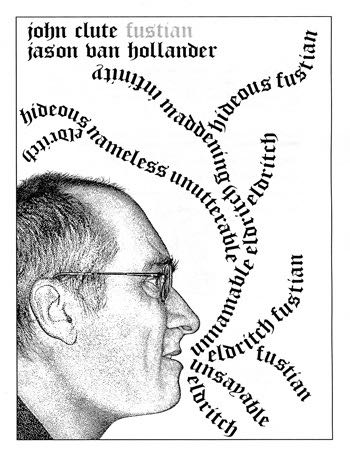
A brief and illuminating interview that just landed in the mailbox of the Endless Bookshelf, courtesy of the artist. I cite two exchanges, noting especially the final sentence.
JVH : What do you most admire about the stories you admire ?
JC : That they do not kiss and tell. That they are not, in other words, coated in the rhetorics of self-importance and significance [. . .] that utterly fail to disguise the dis-ease of their authors : not waving, but drowning. That stories one most admires are bombs within the mind. That when you learn them you learn a little more grammar of human life as we live it now. That they give you recognitions of now.
JVH : Are there any great or famous stories or books that you are not satisfied with ?
JC : I think the ending of Madame Bovary sucks. I hate stories that punish their protagonists for living better than anyone else in the book.
— Michael Connelly. The
Scarecrow (Dennis McMillan Publications, 2009). Connelly’s
novels have chiefly featured murder detective Harry Bosch and criminal
lawyer Mickey Haller ; The Scarecrow alternates
the first person narrative of Jack McEvoy, old school journalist surfing
the dangerous
waters of the collapsing newspaper industry, with brief chapters of
a third person narrative of the criminal protagonist.
McEvoy’s
voice is compelling and engaging ; the threads that tangle to
intersection also point to the decisions of the novelist (how much
to leave out, etc.). Your correspondent takes pleasure in examining
the
scaffolding
of narrative architectures.
A beautiful
production by Dennis McMillan, in a great dust jacket by Michael
Kellner, cover photograph by Christopher Voelker, gift of the publisher
(more about this particular copy later this week).
Anent Michael Connelly, Nicholson Baker writes in the current issue of the New Yorker :
In print, The Lincoln Lawyer swept me up. At night, I switched over to the e-book version on the iPod ($7.99 from the Kindle Store), so that I could carry on in the dark. I began swiping the tiny iPod pages faster and faster.
Then, out of a sense of duty, I forced myself to read the book on the physical Kindle 2. It was like going from a Mini Cooper to a white 1982 Impala with blown shocks. But never mind: at that point, I was locked into the plot and it didn’t matter.
Good metaphor for the difference in platforms, perhaps, but your correspondent begs to differ : what book one reads depends upon the book (the edition, the physical page, the context, etc.).
27 July 09
Current reading
— Michael Connelly. The Scarecrow (Dennis McMillan Publications, 2009).
Recent reading
— Julian Symons. Death’s Darkest Face (Viking,
1990). Novel of the disappearance of poet Hugo Headley long before the book opens.
Poet (and science fiction writer) Tom Disch, who suggested to John Crowley
that
he write a novel about a poet — The Translator (2002), which
is dedicated to Disch — identified
another example of this interesting genre by Christoph Ransmayr, The Last
World
(Die letzte Welt, 1988 ; translated from the German by John Woods,
1990). The form is a complex
retrospective account by Geoffrey Elder, actor and former journalist, who had
known Hugo Headley
in 1936, ostensibly edited by Symons long after Elder’s
death. Symons, who was editor of a poetry journal in the 1930s, sketches Headley
through his brief appearances in Elder’s life (a few verse excerpts cited,
allusion
made to the posthumous works edited by his mistress)
and
as
the
subject
of
the
investigation :
energetic, full of grubby vitality, and a sordid opportunist (a minor Dylan Thomas
clone with
no redeeming qualities).
A
splendid
layering
of narrative distances and first person narratives of questionable reliability.
— Julian Symons. Playing Happy Families (1994; Mysterious
Press, 1995). Entropy and the English middle class. Symons has a way of setting
up characters
and — just when the readers thinks, right, self-righteous conservative jerk,
or mousy and dull — unfolding complexities in matter of fact prose ;
complexities that are rooted in the prior exposition of traits. Playing Happy Families had one short passage where a fact is revealed to the detective that the reader can only deduce ; almost duplicitous, but merely the manipulations of the novelist employing the form of the third person narrative. Seeds were planted in an early conversation.
How
enjoyable
to
have
found,
in
the
space
of
a
month
or
so,
four titles by Symons that I had never seen, even though I read a whole shelf
a decade
ago. I am especially pleased to have come across Death’s Darkest Face and
its narrative strategy.
— Cecil Castellucci and Jim Rugg. The Plain Janes. With lettering
by Jared K. Fletcher (Minx, 2007). Graphic novel, art and high school and life
in the Bush police state.
24 July 09
Where I Write : Fantasy & Science
Fiction Authors in Their Creative Spaces
Photographer Kyle Cassidy has been taking portraits of authors in the natural
environment.
Delighted to observe so many authors’ bookshelves on
view, the Endless Bookshelf and
Temporary
Culture
are
also pleased
to
note
that author Michael Swanwick is at the heart of the project. Cassidy describes
the origins
of
Where I Write as follows :
Some time in late 2008 I got invited to a party at his house, mostly or entirely, I suspect, because he mistook me for someone else. While there I asked if I could see his Hugos, since I knew he had five of them. “ Of course !" ” he said, jovially, and lead me up to his office. This I thought in stunned wonder as my eyes crept across the expanse of it, is a place of great significance and it needs to be seen. It was like I'd cracked open his skull and seen the gears of genius. The best way I can describe it is as a nest, made out of books, as intricate and well assembled as a Nevelson sculpture. I asked him if I could stop back and photograph it. “ Of course, ” he said, “ but not before I clean it up. ” I begged him not to but he replied “ You can't stop me from doing it, nor will you be able to tell that I have.”
Many other authors are featured, including Joe Haldeman (also a Temporary Culture author).
21 July 09
Recent reading :
— Bill Loehfelm. Fresh Kills (2008 ; Berkley Prime Crime pbk., 2009). Deftly written, ultimately successful novel of Staten Island Irish mourning customs. John Sanders, Junior, whose father has been murdered before the novel opens, is angry character whose utter self-involvement and rejection of consequence are grating. I recalled the Sex Pistols song “ Seventeen ” :
“ You’re only 29 / Got a lot to learn / But when your mummy dies / She will not return [. . .] See my face not a trace / No reality ”
as I thought about how disconnected the narrator is his own life. And yet, just as omissions about the age of the narrator become bothersome, and his persistent self-deception threatens to drown the reader, he is compelled by circumstances (and his sister) to rouse himself. The ties of friendship are well delineated ; and the milieu is as carefully observed as A Field Guide to the North American Family. I am still trying to determine if Clute’s term “ Attempted Rescue ” — “ an attempt to rescue oneself from the iron cage of circumstance and destiny and gene ” (in The Darkening Garden , with reference to Robert Aickman) — can be applied to this novel. The term is robust enough to withstand some hammering and flexible enough to move outside of genre ; particularly when Clute notes that “ Even the most successful self is only an Attempted Rescue. ” Junior’s decision at the novel’s end is earned and the conventions of the crime novel are respected even as they are mostly subverted.
This re-issue of Fresh Kills was the single title interesting enough to read from a large crop of mysteries received over the past two months ; the niche market aspect of many of the titles was of greater interest — to see how narrowly the audiences for mystery series might be defined : tattooing, knitting, culinary, home decorating, organizing, wine drinking, etc., etc. — than the prose contained therein.
Today your correspondent has updated
the page with pictures of hand
bookbinding projects and added an additional entry to the course
in micropublishing (below).
As gratifying as it has been
to hear kind words from readers of the Endless Bookshelf, it would be
more instructive and more interesting to all to receive pictures of
bookshelves (working or at play), or to receive words or pictures of
books old and
new.
17 July 09
From the Providence Bureau :
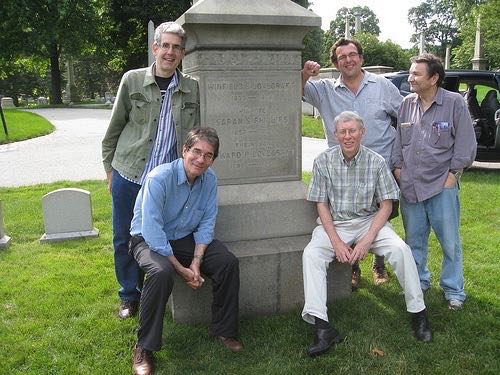
Pilgrims at the tomb of H.P. Lovecraft, July 2009 : Scott Edelman, Paul Di Filippo, Howard Waldrop (standing); Michael Dirda, Michael Bishop (seated). Photograph by D. Newton.
And a reminder asking all readers to send pictures of bookshelves : above your desk, at work, at play.
Room 26 : A Real Place

“ a few of the bookshelves in Room 26 (an actual place — the office from which we post the blog) ” — Timothy Young
Room 26
Room 26 : Cabinet of
Curiosities is the striking, richly illustrated blog of Yale librarians
Timothy Young and Nancy Kuhn and the collections under their gaze,
with (for example) material from Stan
Brakhage’s scrapbooks, portraits of poets by
Jonathan Williams, a guest column on lesbian
pulp novels by Anastasia Jones, and baby
pictures of notable poets, and much else besides. With a suitably
cryptic
picture
of the curators of room 26 (detail below), a trifle more interesting
than the portrait in the official press
release concerning the blog. With thanks to the Anonymous Other
for this fruitful link. The Endless Bookshelf herewith requests pictures
of the working bookshelves in room 26.

Gone, Gone, Gone

One of the joys of making books is to know that publication day means the dispersal of books to the wide world. These books — publisher’s copy in chartreuse cloth (no. 1 of 25) with the five presentation copies in iridescent plum silk — are now scattered to the winds, as are the ideas contained therein.
13 July 09
Recent reading :
— China Miéville. The City & The
City (Doubleday, 2009).
Science fiction detective novel of purest classical form (the murdered woman
is dead before the narrative opens and the circumstances of her death are only
discerned through the determination of the detective, heedless of obstacle or
cost to himself ; the science fiction is in the rupture between direct and virtual,
between human experience and social construct). A brilliant demonstration of
the paranoid, simultaneous co-existence of conjoined opposites : the exclusionary
possibility of the collision of legal and political rhetoric and precisely conditioned
reflexes. The cities of Besz and Ul Qoma seem almost mappable onto the cultural
heritage of eastern Europe, like Hav , but
the interstitial, imaginary history is layered in twenty-first century form.
I
was reminded of the delicious alienation of returning to America after living
in
Europe in
the 1970s ; of life as an expatriate in Egypt ; and of the real but
now notional countries of the vanished eastern bloc. And as a work of the literature
of the fantastic, this book simply could not have been written before the vocabulary
of The Encyclopedia of Fantasy (1997) : polders, wainscots,
thinning.
— Royal A. Gettmann. A Victorian Publisher. A Study of the Bentley
Papers (Cambridge University Press, 1960). When publishing was an activity
undertaken by human beings, contracts were agreements between men and women —
and the successful author could demand very favorable terms. The long-term stability
of prices : a guinea and a half for a three-volume novel (31/6) was the
retail price for more than fifty years. And the cultural revolutions of the 1890s,
when authors began to write in a less stylized voice and at shorter length :
form
is function (see Kipling allusion to the extinction of the three-volume novel
below).
— Julian Symons. Something Like a Love Affair (1992; Mysterious
Press, 1994,
pbk.).
— Julian Symons. The Belting Inheritance (1965 ; 1966 pbk.). Symons
is always good on the socio-psycho-pathology of mid- to late twentieth-century
England.
The upper classes really exist in his books and reveal their least attractive
traits. The Belting Inheritance is interesting for spanning decades
in a precise,
retrospective tone ; Something Like a Love Affair entwines
narratives and has
a tragic conclusion.
— Joan Aiken. The Serial Garden. The Complete Armitage Family
Stories (Big
Mouth House, 2009). Aiken is a literary giant, as tall as Road Dahl and as
playful (if the prose is a trifle less mordant, Aiken is never cardboard or cotton
candy). These stories of the domesticity of English magic have their origins
in the privations of wartime and postwar England but the dynamics of sibling
Mark and Harriet — and Aiken’s attentiveness to the green world of
rural England — ensure they do not grow stale. I will not be reading
this
all in one sitting, however.
— Sarah Waters. The Little Stranger (Riverhead, 2009).
Ghost
story
of
class hierarchies and a decaying country house in late 1940s England, summoning
for
me
the doomèdness
of The Fall of the House of Usher. Query : title reference to the Kipling
poem
The Three Decker (1894), “we never talked obstetrics when the little stranger
came” ? The mood of loss (vanished way of life) is not dissimilar
to The
Belting Inheritance .
— John Crowley. Four Freedoms (William Morrow, 2009).
This
book
is
indisputably a
fantasy of history (the brilliant chronicle of an unrecorded chapter in aviation
history
and simultaneously
a new chapter in the history of American utopian communities). In its evocation
of an imagined city where people gather to create a collective aim, Four
Freedoms is entirely of a piece with all Crowley’s earlier work,
with a profoundly feminist attention and an utter love of women. Just as he evokes
and then dispels a sequence of
events in the new story I heard Crowley read this weekend at Readercon, “And
Go Like
This”, in Four Freedoms he creates in compelling richness the
world before he was born (with even a short exemplary history of Adirondack summer
camps in the 1930s
in the Martha Goldensohn passage). And yet explicit in Crowley’s succession of
narrations is the fact that the traces of this world exist only in ideas and
imagination.
. . . but in the end she wrote nothing. What had happened there couldn’t be recovered, because too much was happening at the same time, and how could you express it all without wiping away all that had made it what it was . . . (pp. 278-9)
The recurring miracle of Crowley’s writing is that — again and again — he does write something, not wiping away but creating.
With author Michael Swanwick in attendance, Hope-in-the-Mist was published at Readercon 20 on Friday 10 July. Immediately following an intimate champagne reception, Swanwick interviewed Hope Mirrlees (portrayed by Marianne Porter, left) in an hour of delightful and biographically accurate improvisational theater.
When links to the recordings become available, they will be posted. The hand bound edition is fully subscribed ; and the paperback edition found many new readers (copies have already been shipped to Australia, Canada, and England). Your correspondent attended several interesting talks (John Clute on the Count of Monte Cristo ; and David Streitfeld interviewing Liz Hand, among others) and readings by Ellen Kushner, Howard Waldrop, and John Crowley. A report on recent reading will follow tonight once dates and page numbers for citations can be verified.
Micropublishing : A
Short Course
1. staff meetings : editor, publisher, binder, marketing department, only one doing anything is the tea-boy
2. money : pay the author first. handshake agreement or written contract, pay the author first
3. money (again) : until money budgeted for project is considered truly lost, not yet ready to begin publishing
4. style : form is function, are you making books or canned goods for the grocery store ?
5. making tea (aka attention to detail)
6. typos : intrinsic to process, & sometimes caught ; inevitable, & to be corrected in second edition ; not to worry
7. scheduling : exceed your familiar repertoire, you will learn how ; long nights are one of the joys
8. lifting books, lifting boxes of books, again, and again ; cardboard boxes not acceptable long-term home decor
9. remember your friends : even when you are doing it all by yourself you are never doing it all alone and unaided
10. publication day : make certain the champagne is cold & books are ready
11. you are a human being, not a corporation ; go to the post office when you can
12. your readers are human beings, too
extra credit :
13. shipping dept. keeps working after radiance of publication
day has waned : joy of dispersal
Lessons one through nine were originally twittered (posted sequentially) in
the marginal glosses from 23 June to 9 July, with an addition on 21 July.
7 July 09
Hope-in-the-Mist : Report from the Bindery
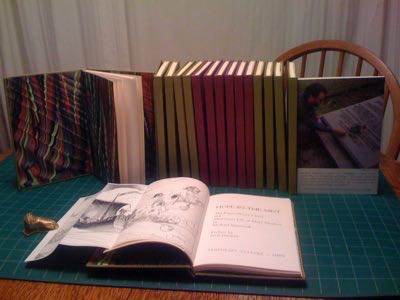
Subscriber & presentation copies bound
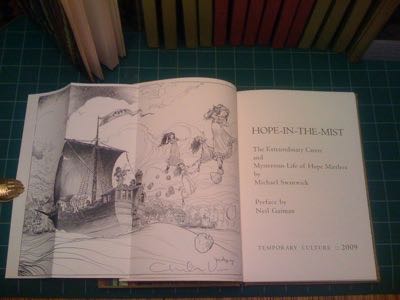
The title page and the Charles Vess frontispiece illustration (folding)
6-7 July 09
Hope-in-the-Mist : In the Bindery
Still toiling in the Temporary Culture bindery : books sewn, cases (cloth bindings) made ; books to assemble ; fingerprints to ink (none genuine without this mark). I have read a few interesting books, about which more on Friday.


This creaking and constantly evolving website of the endless bookshelf : I expect that some entries will be brief, others will take the form of more elaborate essays, and eventually I will become adept at incorporating photos or comments and interactivity. Right now you’ll have to send links to me, dear readers. [HW]
electronym : wessells
at aol dot com
Copyright © 2009
Henry
Wessells and individual contributors.
Produced by Temporary
Culture, P.O.B. 43072, Upper Montclair, NJ 07043 USA.
